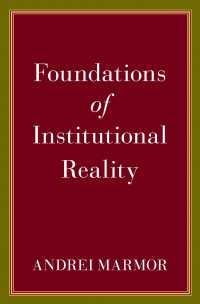Description
James R. Shaw offers a new 'bipartite' reading of Wittgenstein's treatment of rule-following and the foundations of semantics in his seminal Philosophical Investigations. On this reading, Wittgenstein's remarks are split between two logically distinct projects marked by different guiding questions, presuppositions, and methodologies. It shows how the attribution of this thoroughgoing bipartite structure resolves a number of internal tensions in the text and reveals Wittgenstein's controversial remarks on human agreement to exhibit a surprising attentiveness to, and plausible treatment of, a blurring of the semantics/metasemantics distinction arising in Wittgenstein's treatment of foundational semantic questions. Shaw then turns to an extended engagement with "Kripkensteinean" meaning skepticism. While on the reading offered, Wittgenstein never countenanced meaning skepticism, his work in the foundations of semantics gives us the resources to develop an unusual naive reply to the skeptic not yet explored in literature. Shaw argues that the Wittgensteinean reply is simple, effective, generalizable, and theoretically `light-weight', so that a theorist of almost any stripe could in principle take it up.
Table of Contents
Abbreviations PrefaceChapter 1: IntroductionPart I: The Bipartite Reading and the Role of Agreement Chapter 2: The Justificatory Question (§185)Chapter 3: The Justificatory Investigation (X-§201)Chapter 4: The Grammatical Investigation (§§199-242)Chapter 5: Agreement (§§240-242)Chapter 6: The Twofold Investigation: Philosophical Methodology and the Tractatus 1Part II: Wittgenstein and Meaning Skepticism Chapter 7: Wittgenstein and KripkeChapter 8: Kripkensteinean Skepticism through a Wittgensteinean LensChapter 9: Dispositions: an Exegetical AsideChapter 10: Notions of Uniformity: A 'Wittgensteinean' Solution and its PrecursorsChapter 11: Relativism: Communities, Languages, and Forms of LifeChapter 12: Kripke v. Wittgenstein: Some Final RemarksBibliography Index








